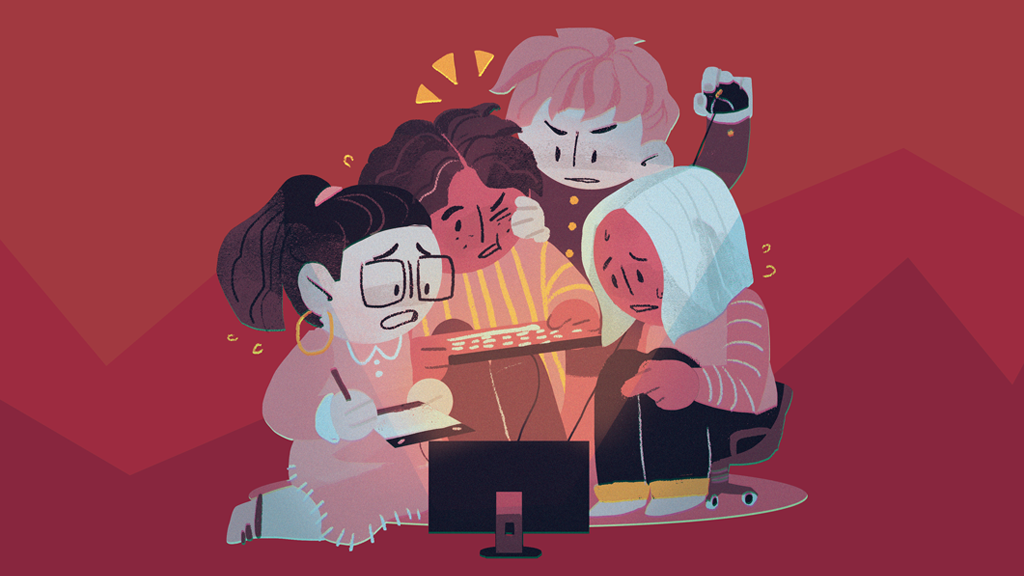According to Animation Career Review, the College of Art and Design (CAD), formerly CIAS, School of Film and Animation (SOFA) was ranked 10th in the country for animation this year. The school is split into Animation, Live Action and Motion Picture Science (MPS) — all with their own specializations and focuses. Filmmaking and senior projects are mandatory, causing SOFA programs to be very equipment-heavy.
Space and Faculty
The average class size for SOFA is about 63 students, so workspaces are often tight. The main 3D animation lab is a shared space among art and design majors, causing students to constantly compete for computers. The HD lab is a SOFA priority lab that seats 24, but is shared by all of the Animation, Live Action and MPS majors.
“SOFA is expecting a 33 percent increase in accepted freshman,” SOFA Administrative Chair Malcolm Spaull said. Starting this fall SOFA will accept 84 freshmen every year. The new addition of the Magic Spell Studios facility will alleviate SOFA’s population congestion, but won’t solve all of its problems. Spaull admitted that the biggest issue SOFA faces is a lack of faculty.
“SOFA doesn’t have enough teachers who are up to date with the programs,” Hackett said.
Budget and Equipment
SOFA has to make sure all of their equipment and software is “industry standard.” Magic Spell Studios, although completely built, will not start out fully equipped. SOFA was graced with the new building, but must conform to CAD administrative budgets, including the 20k rule. According to Spaull, this rule requires that all requested equipment cost less than $20,000. Next to equipment costs, the maintenance of software licenses is also a large expense and would need to be increased for the new facility.
“Fortunately, the only software we pay out of pocket for, from our budget must be unique to SOFA,” Spaull said.
Some of those SOFA exclusive licenses include sound editing software, such as ProTools, which is the industry standard. Lecturer Dave Sluberski teaches all the sound classes in SOFA. His Basic Sound Recording class is required for second year SOFA students, but is competitive for space and resources.
“My classes are getting bigger and overloaded ... I have 18 seats of ProTools but my classes have 25 to 30 students,” Sluberski said.
The classroom isn't the only area of congestion. Students required to do a final sound project often compete with sound editors working on films. With a limited amount of licenses, recording equipment and editing space, students often scramble to finish projects on time.
This also impacts 3D animators whose limited lab space makes rendering difficult.
3D rendering is the process of converting 3D computer graphics and models into 2D images, often with realistic qualities such as lighting, textures and perspective. Rendering is a time consuming process that is often interfered with by ongoing classes or non-SOFA major students using lab space. Students can choose to either render directly on the computer, or if they’re an upperclassman, through a server called Render Farm.
Training and Instruction
“[Render Farm had] a lot of glitches in renders that were sending Arnold [a rendering software] back with watermarks and black frames,” Hackett said. According to Hackett, a former Render Farm lab assistant, most students weren’t formally trained on how to use Render Farm and instead opted to computer-sit while their renders complete. Now, after so many glitches with the server, students no longer trust the system. David Long, the chair of MPS and the new head of Magic Spell Studios, insists that students utilize Render Farm.
“We encourage students not to [render] 4k [or ultra HD]. It’s burdensome on the Render Farm and it’s not really necessary,” Long said.
Although MPS is the smallest class in SOFA, with approximately 15 students per year, it has the most advanced equipment. They are also the only SOFA students who will graduate with a Bachelor of Science degree because they train to become engineers instead of filmmakers.
“We practice as research engineers ... who make hardware, software, equipment and products for companies or become experts in the field,” Long said.
Although MPS students are trained to use high-end equipment such as motion capture systems, surround sound and 4k cameras, many of this isn’t used in SOFA films. This is an issue throughout all of SOFA; students rarely collaborate with each other and hardly venture outside their focus area. The lack of teamwork and training contributes to the lack of access.
“There’s a big green screen and other equipment in the cage that the majority of students don’t know how to use and it goes to waste,” Hackett said.
Despite issues with programs and equipment, SOFA students still graduate highly skilled in their respective fields and more.
“Because of my time at SOFA, I was able to step in and help [with production] even though I wasn’t a grip or gaffer,” Amao said.
Amao’s only hesitance was SOFA’s lack of preparation for freelance work. “I wish we were taught business experience as a freelancer, like how to do taxes or write an invoice,” Amao said.
She made the case that just one more class in pitching or marketing yourself as a brand would’ve eased her transition into the industry. Similar to Hackett’s concerns, many other students feel SOFA has the tools, but not the time, to teach. Spaull explained one of his goals with Magic Spell Studios is to provide a better environment to expand SOFA, such as adding a collaborative game track to animation or creating a master’s degree program for MPS. The ideas are there, but the question is whether SOFA has the resources and manpower to bring them into fruition or not.
“It’s a continual battle for SOFA. It has to be,” Sluberski said.








